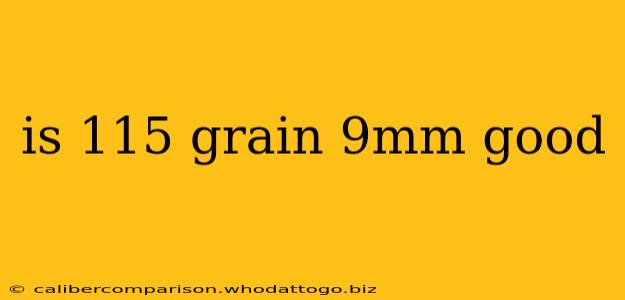Is 115 Grain 9mm Good? A Comprehensive Look at 9mm Ammunition
The question, "Is 115 grain 9mm good?" doesn't have a simple yes or no answer. The ideal 9mm grain weight depends heavily on your intended use: target shooting, self-defense, or competitive shooting. Let's delve into the specifics of 115-grain 9mm ammunition and explore its pros and cons in various contexts.
Understanding Grain Weight and its Impact
The "grain" refers to the weight of the bullet, measured in grains (7,000 grains = 1 pound). A heavier bullet generally translates to:
- More mass: This leads to greater momentum, potentially resulting in more stopping power.
- Lower velocity: Heavier bullets typically travel slower than lighter ones when fired from the same barrel length.
- Increased recoil: The added mass increases the felt recoil.
115 Grain 9mm: Pros and Cons
Pros:
- High Velocity: Compared to heavier grain weights (like 124 or 147 grains), 115-grain 9mm rounds generally exhibit higher muzzle velocity. This increased velocity contributes to flatter trajectories at longer ranges, making them suitable for target shooting where precision at distance is crucial.
- Reduced Recoil (relatively): While still presenting recoil, 115 grain rounds often generate less felt recoil than heavier options, leading to quicker follow-up shots and potentially improved accuracy for some shooters.
- Wide Availability and Affordability: 115-grain 9mm is commonly produced and readily available, often at competitive prices compared to other grain weights. This makes it a popular and accessible choice for both casual and frequent shooters.
Cons:
- Less Stopping Power (compared to heavier rounds): The lower mass compared to heavier bullets like 147 grain means potentially less penetration and stopping power. This is a crucial factor to consider when selecting ammunition for self-defense purposes. While 115 grain can certainly be effective, it might not be the optimal choice for every self-defense scenario.
- Potential for Overpenetration: The higher velocity can increase the risk of overpenetration, particularly when used in densely populated areas or with certain barrier materials. This requires careful consideration of your shooting environment.
115 Grain 9mm for Different Applications:
-
Target Shooting: 115-grain 9mm ammunition is perfectly adequate and often preferred for target shooting due to its high velocity and generally lower cost. The flatter trajectory makes it easier to hit targets at longer distances.
-
Self-Defense: While effective, 115-grain 9mm should be carefully considered for self-defense. The potential for overpenetration and lower stopping power compared to heavier rounds are significant factors. Many self-defense experts recommend exploring heavier grain options, particularly for those concerned about penetration and minimizing collateral damage.
-
Competitive Shooting: The choice will greatly depend on the specific discipline. Its high velocity can be advantageous in some competitions, while in others, factors like recoil and accuracy at varying distances become more critical.
Conclusion:
Ultimately, whether 115-grain 9mm is "good" depends entirely on your specific needs and priorities. For target shooting, its high velocity and affordability make it a popular and effective choice. However, for self-defense, a thorough consideration of the potential drawbacks, including overpenetration and potentially lower stopping power relative to heavier rounds, is necessary. Before choosing any ammunition, always consult with experienced shooters, firearm instructors, or refer to reputable ballistics information. Your safety and the safety of others should always be the top priority.

